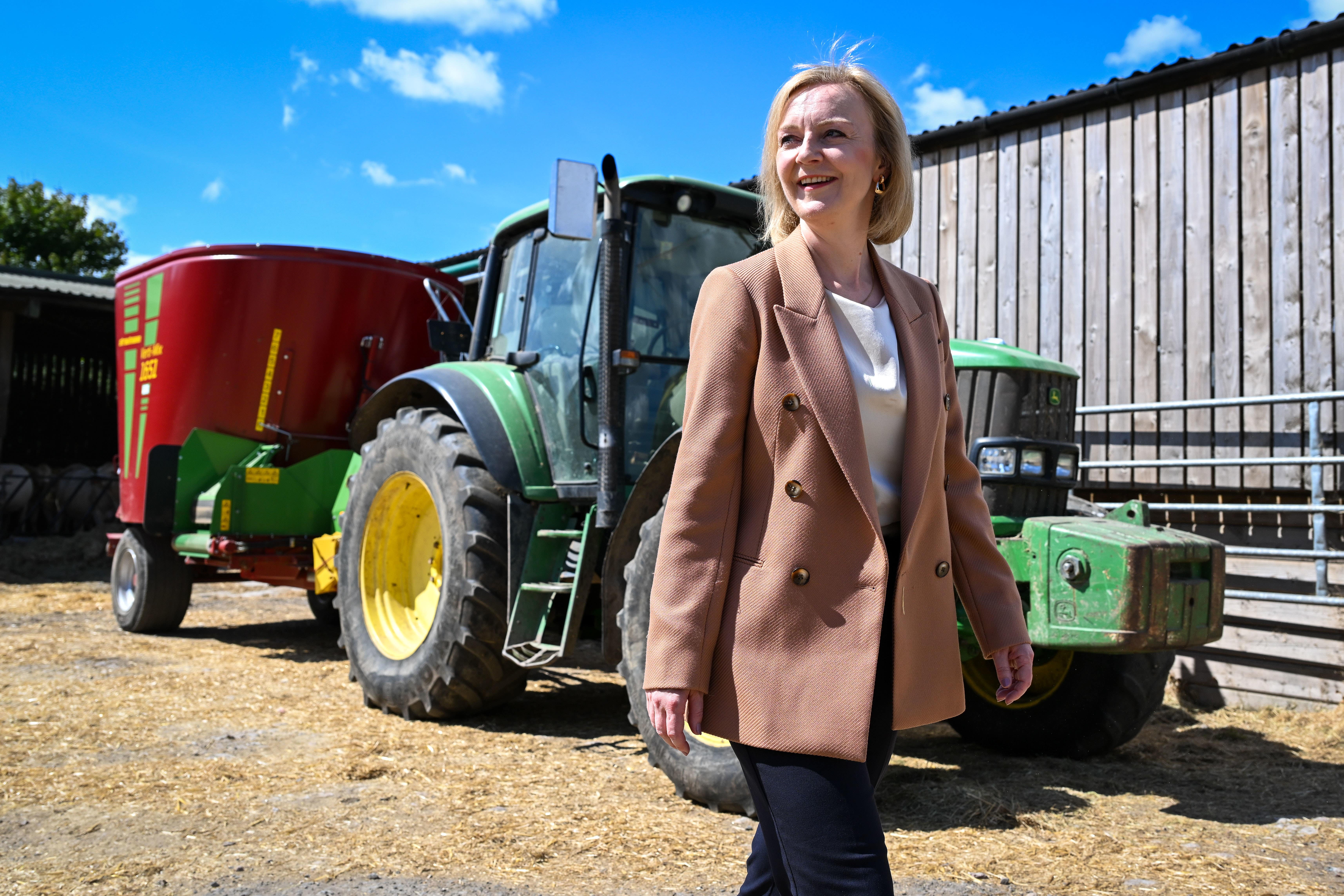Liz Truss opposes placing solar panels on farmland, Downing Street says
It comes amid reports that Environment Secretary Ranil Jayawardena is considering stricter planning rules for solar power developments.

Your support helps us to tell the story
From reproductive rights to climate change to Big Tech, The Independent is on the ground when the story is developing. Whether it's investigating the financials of Elon Musk's pro-Trump PAC or producing our latest documentary, 'The A Word', which shines a light on the American women fighting for reproductive rights, we know how important it is to parse out the facts from the messaging.
At such a critical moment in US history, we need reporters on the ground. Your donation allows us to keep sending journalists to speak to both sides of the story.
The Independent is trusted by Americans across the entire political spectrum. And unlike many other quality news outlets, we choose not to lock Americans out of our reporting and analysis with paywalls. We believe quality journalism should be available to everyone, paid for by those who can afford it.
Your support makes all the difference.Liz Truss opposes the installation of solar panels on productive agricultural lands, Downing Street has said, amid reports that ministers are seeking to restrict the development of solar projects on farms in England.
Environment Secretary Ranil Jayawardena is also understood to want to protect farmland amid concerns over food security.
He is considering redefining land categories to curb the development of solar power, effectively skewing the planning system against the renewable energy source, according to The Guardian.
The UK solar sector is alarmed by attempts to put major planning rules in the way of cheap, homegrown energy
Asked about the report, the Prime Minister’s official spokesperson told journalists: “I can point you back to what the Prime Minister said, I think at the start of September, when she said she doesn’t think we should be putting solar panels on productive agricultural lands, because obviously as well as the energy security issue, we face a food security issue. So we need to strike the right balance.”
Pressed on whether farmers or the Government should decide how to use farmland, the official said: “Of course it is right that farmers who own farms decide how best to use it, and I think she was clear about that during the campaign.”
When asked how the tightening of planning rules fits in with Ms Truss’s pro-growth agenda, her spokesman said: “I think it’s important to wait for the detail rather than get into speculation”.
The solar industry has criticised the Government’s reported move, saying it would put the Environment Secretary in the “anti-growth coalition” she railed against in her speech at her party’s conference last week.
Solar Energy UK CEO Chris Hewett said: “The UK solar sector is alarmed by attempts to put major planning rules in the way of cheap, homegrown energy.
“Solar power is the answer to so many needs and policy demands: it will cut energy bills, deliver energy security, boost growth and help rural economies.
“Ranil Jayawardena’s opposition to solar farms must surely make him part of the anti-growth coalition.”
The Prime Minister has previously expressed doubts about the “depressing” spread of solar power “paraphernalia” on agricultural land, a sentiment echoed by Energy Secretary Jacob Rees-Mogg.
At a fringe event at the Conservatives’ annual gathering, he dismissed the idea that sheep and cattle could graze in fields with the panels, claiming the grass under them would be as poor as that under the trampoline in his garden.
There is always a tension between what you regulate and what you don't regulate
Mr Rees-Mogg said: “You say sheep may safely graze but they don’t get all the grass because they are covered by solar panels. So they may graze but they are gonna be quite hungry sheep, aren’t they with just the little bits around the solar panels.
“Grass doesn’t grow underneath things because the sun doesn’t get through, because the sun’s going to the solar panel, so they (the panels) may be on stilts but what you get growing underneath is sort of weedy stuff that isn’t very nutritious.
“I know this from my own garden where we’ve got a beastly bouncy thing – what are they called, trampolines? And underneath the trampoline, the grass is dead. I’ve got a couple of sheep actually, if they went under the trampoline, they wouldn’t get much nutrition.”
He added: “There is always a tension between what you regulate and what you don’t regulate. And it is all about balance. I think we need to have some concern about food security, and therefore maintaining highly productive agricultural land is quite a sensible interest.”
The Government has faced a backlash after lifting England’s fracking ban, in place since 2019 following a series of earth tremors, and giving the green light to the expansion of oil and gas operations in the North Sea.